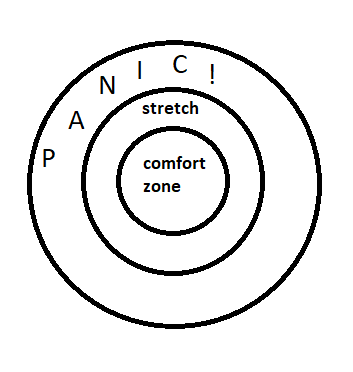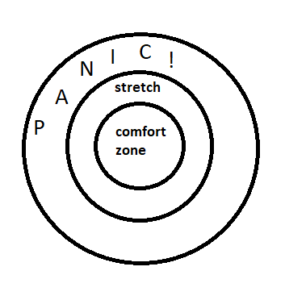
Our comfort zones are meant to keep us safe and, well, comfortable, but they can sometimes hold us back from something we want or need and prevent a growth mindset. I first learned about this diagram not too long ago and presented it to my children. The comfort zone is where you feel safe and comfortable, you are relaxed. A stretch is where you’re a little out of your comfort zone maybe a little uncomfortable but you aren’t panicking.
This simple graphic can be very impactful for a child that struggles trying new things or has a big transition ahead. It can help them understand that stretching their comfort zone is ok and healthy and it also helps quite a bit with growth mindset everyone’s talking so much about. Below is a printable you can show your kids to help them with this too.
Stretching 20% of The Time will Increase Your Comfort Zone and Your Growth Mindset.
Isn’t that cool?! Just show this graphic to your kids and explain that a stretch is good, but if they begin to feel panic, it might be time to take a break and try again after some comfort zone time. Soon, they’ll be ready to stretch again!
In some cases, staying in the comfort zone can keep children in a fearful or anxious place. And that’s when we, as caregivers – and as teachers – need to help our children STRETCH in order to encourage that growth mindset. We can help them learn that they can do hard things!
Have you ever had a problem that just made you panic? It felt way out of your reach, abilities, or control and you were sure you couldn’t handle it? Our children can feel the same way about trying new things, going new places, or when approaching unknowns of any kind.
So What Do I Mean by STRETCH?
Lev Vygotsky studied children’s development and coined the term “zone of proximal development”. Sometimes called the ZPD, it is an area of learning that happens when a person is assisted by someone with more skills.
In the case of STRETCH, you, the adult, are the teacher. And the child learning the skill set cannot do it without the assistance of a teacher. In other cases, the teacher may be a peer with more skills, but here, that person is YOU.
The teacher assists with the minimal level of help necessary until the child no longer needs assistance. This same process is also referred to as scaffolding. Don’t just look at what the child is capable of doing on their own. You can also look at what they are capable of doing with social and emotional scaffolding. Your job is to help move the child’s mind forward step by step, mindful of which lessons the child is ready for.
You’re probably already a master at scaffolding for day to day activities. You don’t expect your one-year-old to make their own lunch, but over time you’ve shown your child how to open a jar, use a butter knife, and cut bread. It’s likely the same for getting dressed, tying shoes, or even brushing their teeth. We teach them by breaking them down into steps that are manageable for developing bodies and brains. In other words, we let them do what they CAN do and provide minimal help in supporting until they are able to do it on their own. We can use these same techniques and apply them to social-emotional growth and development. Here’s an example of how that worked in our home.
My children started a new school and they were also signed up for a new soccer team. One of them told me “Mom, I’m stretching every day in this school. Soccer is way too much stretch right now. I need to rest in my comfort zone after school for a while. So taking this information in, we decided that skipping soccer this season and trying basketball in the winter league would be a way to manage the stretch and keep it from becoming overwhelming and out of the panic zone. The school transition went smoothly, my children could articulate their comfort zones and watch them grow with each new “stretch experience.” This has been such a useful tool for increasing their mindfulness and self-awareness.
How Can You Help Your Kids STRETCH Instead of Panic?
- Use reflective or active listening to try to fully understand the underlying issue or fear the child is facing. Where is the comfort zone?
- Identify where the child may be ready to stretch. What skills or language do they already have for this situation?
- Have the child, if they can, give you some ideas of how far they can stretch. What action might they be able to take with a little help?
- Make a plan with the child. What steps will they take and how can you help?
- Support them in executing the plan!
The concept of scaffolding is used in learning throughout life and is the basis of how everyone learns b

est. It has been applied to constructivist teaching, meeting students where they are at, and identifying individual styles and strengths in learning. Because humans do not usually begin by knowing everything that there is to know, the basics are learned first, and skills and knowledge build upon each other towards mastery.
The same is true for social and emotional learning. The skills build on each other, and without a knowledgeable teacher to guide us, those big skills or events can be panic-inducing. So before we make a big leap, we need help to STRETCH and let them spend time in their COMFORT ZONE to recover from big stretches or panic.
Want more posts like this? Check these out ⤵⤵⤵
How to Teach Kids About The Brain – Hey Sigmund
When Fear Takes Over Your Child – Respectful Parent



[…] One Tip to Foster a Growth Mindset in Kids – Respectful Parent […]